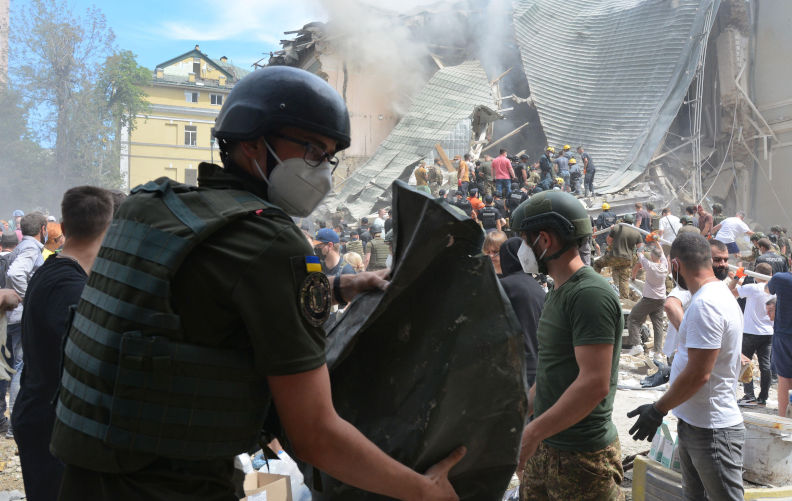Bombing a hospital with children, especially those with cancer, is a desperate act. So, who is most desperate right now? Is Putin desperate? Not really. Are the Americans and Europeans desperate? Yes, they are. Here’s my logic.
Russia, in the 30 months of this military operation, has managed to avoid bombing hospitals, focusing instead on strategic military targets. Compare this to the death and destruction (and the nearly 30 hospitals) destroyed in Gaza since October 2023. Suddenly bombing a hospital would be a move completely absent of strategic intent – unless one believes the extreme propaganda that paints Putin as an evil madman.
Putin understands this conflict is not just a hot war on the ground but also an information war. An attack on a hospital would undeniably turn public opinion against him and in favour of the US and EU, garnering support for more military aid to Ukraine. As the tide is turning and European public sentiment is moving strongly in an anti-war direction, why would Russia want to spark more Russophobia?
This act of desperation seems calculated to sway public opinion. Elections on both continents have the potential to disrupt neocon, war hawk plans to maintain global US supremacy and (as some have openly suggested) break up Russia into small, manageable parts – particularly if any anti-war candidates manage to win government.
Meanwhile, Putin is garnering support from global leaders. Currently President of BRICS, Putin is in active conversation with emerging global leaders, from Indonesia to China, as well as existing powers such as Saudi Arabia. Modi’s visit to Moscow for example, was reported in glowing terms in India, focusing on the long-standing friendship between Russia and India, a relationship that irritates the US. India’s refusal to cut ties with Russia and stop buying its oil and gas highlights the limits of US influence. Moreover, recent discussions in Beijing, with Belarus’s inclusion in the Shanghai Cooperation Organisation (SCO) signify the growing alliance against US hegemony and the move away from the US dollar as the global currency. And the growing size and collaboration potential of BRICS is undoubtedly unnerving US strategists as they increasingly hear the voice of dissent from what were previously small nations acquiescing to a great power.
Then there is Europe. While Germany and other EU leaders talk about “unconditional surrender” as the only path to peace, Viktor Orbán, Prime Minister of Hungary, has been working behind the scenes to bring discussions to some semblance of reality. Orban recently visited Putin and Zelensky to discuss a peace deal, advocating for EU interests despite severe criticism from other EU leaders. Orbán plans to share key points of the conversation with Trump, should he be elected in November, to help end the crisis. Watch the interview between Viktor Orban and Paul Ronzheimer, a German journalist, specialist war commentator.
On the ground, Russia is not in a position of desperation, moving slowly but surely across a number of fronts. Meanwhile, the US and NATO are not faring so well with shortages in weaponry and personnel, and the risk of another Vietnam-like quagmire grows daily. European elections show a population increasingly anti-war, desiring peace, wanting an end to the conflict. Yet, NATO and the EU persist in their pro war rhetoric, losing popular support and perhaps feeling the need to demonise Putin further.
But logic alone doesn’t tell the whole story. There needs to be evidence. The “evidence” so far presented —the discovery of a missile part, guiding mechanism intact- and complete with visible and legible serial number at the blast’s epicentre—seems highly dubious, reminiscent of the conveniently discovered passport of one of the 9/11 terrorists at the Twin Towers. Back then, we are expected to believe that a blast hot enough to melt a 100 storey building, will allow a paper booklet passport to survive. Now we are being asked to believe that a missile remnant, complete with identifiable and legible serial number survived a similar blast.
Right now, as of yesterday (same day as the bombing of a hospital in Kyiv) NATO leaders are meeting in Washington to celebrate its 75th anniversary and discuss expanding into the Pacific. It would be strategically beneficial for them to justify their existence by portraying an urgent need to defend against the enemy. A hateful, irrational enemy would be the best kind to serve this purpose.
Finally, Russian officials have denied involvement, suggesting it was a Ukrainian misfire. Given the current geopolitical landscape—with many aligning with Russia, China, BRICS, and the SCO and the possibility of a Ukraine-friendly US president in the White House later in the year —it seems more plausible that the strike was carried out by Ukraine/NATO rather than Russia.
Remember these doubts and questions. Remember the other agendas hiding forcefully in plain sight. Remember the pilot’s passport miraculously discovered in the incalculable rubble of the twin towers, and the missile serial number found so quickly in Kyiv. The way the video missiles “fell from the sky” rather than spearing deliberately to a target. Remember the non-attack in the bay of Tonkin that triggered a10 year war in SE Asia.
Let time, reason and investigation reveal history’s verdict – whose malevolence, whose incompetence. We wait and watch with interest.
Trisha Drioli
Trisha Drioli is a retired Senior Sustainability Practitioner and University Lecturer, with over 30 years experience in government policy and strategy before moving to teaching role at the University of South Australia until her retirement in 2020. Trisha is currently actively engaged in monitoring geopolitical activity abroad, and exploring western philosophical thought as a way of unravelling the complexity of our 21st century world. You can follow Trisha on Twitter at Tee@EasternTrisha.
